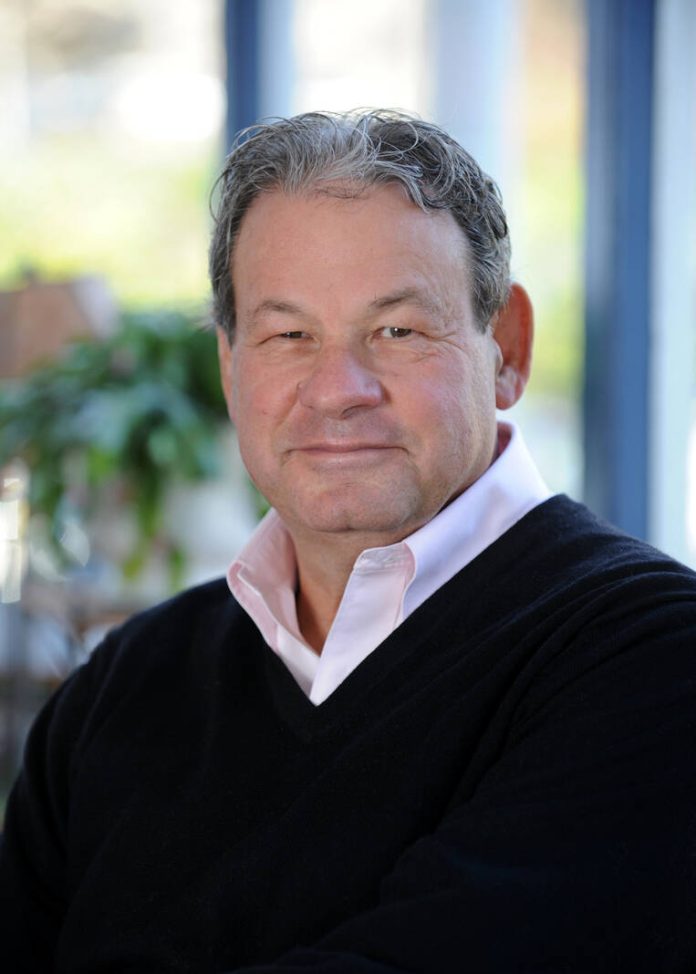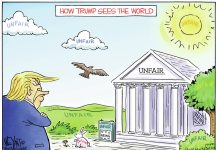“We pledge to you,” Donald Trump told a New Hampshire rally, “that we will root out the Communists, Marxists, fascists and the radical left thugs that live like vermin within the confines of our country.”
In a radio interview, he charged that terrorists and criminals are breaching our borders and “poisoning the blood of our country. It’s so bad, and people are coming in with disease. People are coming in with every possible thing that you could have.”
Trump’s words echo the hate-filled language of history’s worst tyrants. “Calling people ‘vermin’ was used effectively by Hitler and Mussolini to dehumanize people and encourage their followers to engage in violence,” Ruth Ben-Ghiat, a New York University historian, told the Washington Post. John F. Kelly, who served as Trump’s chief of staff, said to CNN that his former boss “admires autocrats and murderous dictators.”
But Trump is also a very American figure who reflects and exploits nativist impulses that have always polluted American life. That xenophobia, or hatred of foreigners, is rooted in the fear of infection — both the infection of ideas and the infection of disease. The first virus, goes this deranged and dangerous argument, poisons the nation’s political bloodstream; the second corrupts the physical bloodstream. But both maladies have the same goal — to degrade our national character, to weaken our defenses against our enemies.
Trump fits this pattern perfectly. His rant against “radical left thugs” is classic political demagoguery. His alarm over germ-ridden immigrants plucks the second chord of conspiracy.
Sixty years ago, the great political historian Richard Hofstadter called this strain the “paranoid style” in American politics, and wrote in the November 1964 issue of Harper’s magazine, “The paranoid style is an old and recurrent phenomenon in our public life which has been frequently linked with movements of suspicious discontent.”
In 1753, Benjamin Franklin denounced the German immigrants flocking to Pennsylvania as “generally the most ignorant Stupid Sort of their own Nation.” In the mid-19th century, virulent anti-Catholicism flourished; Hofstadter quotes an 1855 Texas newspaper: “It is a notorious fact that the Monarchs of Europe and the Pope of Rome are at this very moment plotting our destruction and threatening the extinction of our political, civil, and religious institutions.” Even the president, the paper alleged, “is tainted with the infectious venom of Catholicism.”
In 1882, Congress banned new Chinese immigrants from entering the U.S. and barred those already here from becoming citizens. During World War II, more than 100,000 Japanese Americans were forcibly evacuated from their homes and businesses on the West Coast as “security risks.” After the war, survivors of Nazi persecution were prevented from entering the U.S. and denounced for harboring two pernicious “isms”: Judaism and communism. It took the civil rights bills of the mid-1960s to fully protect Black voting rights a century after the Civil War.
Trump launched his political career by appealing directly to this paranoid tradition, vowing to build a wall across the southern border and declaring, “When Mexico sends its people, they’re not sending their best. … They’re bringing drugs. They’re bringing crime. They’re rapists.”
As president, he kept returning to the same ugly themes: banning travelers from Muslim countries, denouncing immigrants from “s—-hole countries” like Haiti, praising white supremacist marchers in Charlottesville as “very fine people,” blaming China for the COVID-19 pandemic and using a racist slur to refer to the disease, etc.
In his campaign for a second term, he’s doubling down on his nativist appeals. He promised “the largest deportation operation in history” to loud applause in Waterloo, Iowa. More than 140 years after the Chinese Exclusion Act, he’s vowing to crack down on trade with Beijing and “ban Chinese companies from owning vital U.S. infrastructure in sectors such as energy, technology and agriculture,” reports the Associated Press.
The final piece of the paranoid style, notes Hofstadter, is the leader who proclaims himself a savior, the only one who can redeem the country’s honor. And at a Texas rally, Trump did just that, declaring that the next election is “our final battle” and vowing, “I am your warrior. I am your justice.”
“The paranoid spokesman sees the fate of conspiracy in apocalyptic terms,” writes Hofstadter. “He traffics in the birth and death of whole worlds, whole political orders, whole systems of human values. He is always manning the barricades of civilization. He constantly lives at a turning point.”
This time, Trump is right. We are at a turning point. He fully represents the paranoid tradition, our worst impulses and deepest flaws. Will we embrace or reject them?
Steven Roberts teaches politics and journalism at George Washington University. He can be contacted by email at [email protected]. Send comments to [email protected].




